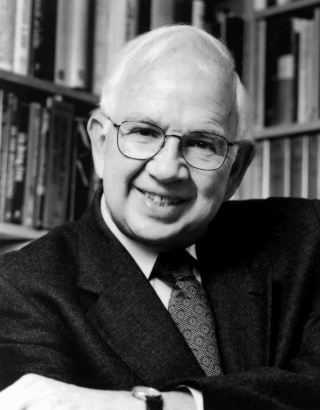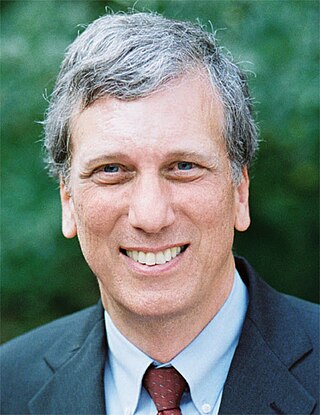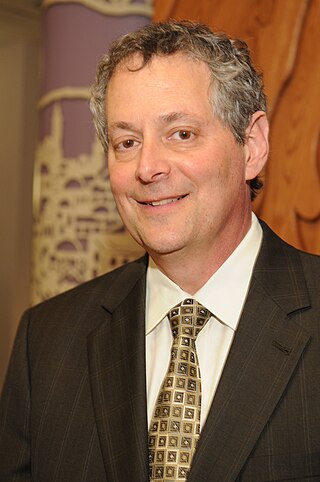Related Research Articles

Harold Samuel Kushner was an American rabbi, author, and lecturer. He was a member of the Rabbinical Assembly of Conservative Judaism and served as the congregational rabbi of Temple Israel of Natick, in Natick, Massachusetts, for 24 years.

Judaism is an Abrahamic monotheistic ethnic religion that comprises the collective spiritual, cultural, and legal traditions of the Jewish people. Judaism evolved from Yahwism, an ancient Semitic religion of the late Bronze Age to early Iron Age, likely around the 6th/5th century BCE. Along with Samaritanism, to which it is closely related, Judaism is one of the two oldest Abrahamic religions.

Reconstructionist Judaism is a Jewish movement based on the concepts developed by Rabbi Mordecai Kaplan (1881–1983) that views Judaism as a progressively evolving civilization rather than just a religion. The movement originated as a semi-organized stream within Conservative Judaism, developed between the late 1920s and the 1940s before seceding in 1955, and established a rabbinical college in 1967. Reconstructionist Judaism is recognized by many scholars as one of the five major streams of Judaism in America alongside Orthodox, Conservative, Reform, and Humanistic.

A Kingdom Hall is a place of worship used by Jehovah's Witnesses. The term was first suggested in 1935 by Joseph Franklin Rutherford, then president of the Watch Tower Society, for a building in Hawaii. Rutherford's reasoning was that these buildings would be used for "preaching the good news of the Kingdom".

Interfaith dialogue refers to cooperative, constructive, and positive interaction between people of different religious traditions and/or spiritual or humanistic beliefs, at both the individual and institutional levels.

Tikkun was a quarterly progressive Jewish and interfaith magazine and website published in the United States that analyzed American and Israeli culture, politics, religion, and history in the English language. The magazine consistently published the work of Israeli and Palestinian left-wing intellectuals, but also included book and music reviews, personal essays, and poetry.

Jonathan Henry Sacks, Baron Sacks was an English Orthodox rabbi, philosopher, theologian, and author. Sacks served as the Chief Rabbi of the United Hebrew Congregations of the Commonwealth from 1991 to 2013. As the spiritual head of the United Synagogue, the largest synagogue body in the United Kingdom, he was the Chief Rabbi of those Orthodox synagogues but was not recognized as the religious authority for the Haredi Union of Orthodox Hebrew Congregations or for the progressive movements such as Masorti, Reform, and Liberal Judaism. As Chief Rabbi, he formally carried the title of Av Beit Din (head) of the London Beth Din. At the time of his death, he was the Emeritus Chief Rabbi.
Interfaith marriage, sometimes called interreligious marriage or "mixed marriage", is marriage between spouses professing different religions. Although interfaith marriages are often established as civil marriages, in some instances they may be established as a religious marriage. This depends on religious doctrine of each of the two parties' religions; some prohibit interfaith marriage, and among others there are varying degrees of permissibility.

Joseph Telushkin is an American rabbi and writer. He has authored more than 15 books, including volumes about Jewish ethics, Jewish literacy, as well as the book Rebbe, a New York Times bestseller released in June 2014.

Arnold M. Eisen is an American Judaic scholar who was Chancellor of the Jewish Theological Seminary in New York. He stepped down at the end of the 2019-2020 academic year. Prior to this appointment, he served as the Koshland Professor of Jewish Culture and Religion and chair of the Department of Religious Studies at Stanford University. Prior to joining the Stanford faculty in 1986, he taught at Tel Aviv University and Columbia University.
Vern Barnet is a Unitarian Universalist pastor and was the weekly newspaper columnist on religious topics in The Kansas City Star 1994-2012. He is the founder of the Kansas City (area) Interfaith Council.
Religious behaviours are behaviours motivated by religious beliefs. Religious actions are also called 'ritual' and religious avoidances are called taboos or ritual prohibitions.
Lawrence A. Hoffman is an American Reform rabbi and a prominent scholar of Jewish liturgy. He is known for his liberal religious views.

Arnold E. Resnicoff is an American Conservative rabbi who served as a military officer and military chaplain. He served in Vietnam and Europe before attending rabbinical school. He then served as a U.S. Navy Chaplain for almost 25 years. He promoted the creation of the Vietnam Veterans Memorial and delivered the closing prayer at its 1982 dedication. In 1984 the President of the United States spoke on his eyewitness account of the 1983 Beirut barracks bombing. After retiring from the military he was National Director of Interreligious Affairs for the American Jewish Committee and served as Special Assistant to the Secretary and Chief of Staff of the United States Air Force, serving at the equivalent military rank of Brigadier General.
Dana Evan Kaplan is a Reform rabbi known for his writings on Reform Judaism, in particular, and American Judaism, generally. He has also written on other subjects, including American Jewish history and Jews in various diaspora communities. Kaplan has been the rabbi of Temple Beth Shalom of the West Valley in Sun City, Arizona, since June 2019.

Jack Moline is an American Conservative rabbi who retired as executive director of Interfaith Alliance in 2022, having served in the post since January 2015.

Laura Naomi Janner-Klausner is a British rabbi and an inclusion and development coach who served as the inaugural Senior Rabbi to Reform Judaism from 2011 until 2020. Janner-Klausner grew up in London before studying theology at the University of Cambridge and moving to Israel in 1985, living in Jerusalem for 15 years. She returned to Britain in 1999 and was ordained at Leo Baeck College, serving as rabbi at Alyth Synagogue until 2011. She has been serving as Rabbi at Bromley Reform Synagogue in south-east London since April 2022.
Living Interfaith is an Interfaith movement founded by Reverend Steven Greenebaum, which embraces the teachings of all spiritual paths that lead people to seek a life of compassionate action.

Rami M. Shapiro, commonly called "Rabbi Rami", is an American Reform rabbi, author, teacher, and speaker on the subjects liberal Judaism and contemporary spirituality. His Judaism is grounded in the perennial philosophy.

Yonatan Neril is an interfaith environmental advocate, NGO director, and rabbi. He is the founder and current director of the Interfaith Center for Sustainable Development (ICSD), a non-profit organization based in Jerusalem.
References
- 1 2 3 4 "MATLINS, Stuart M. 1940-". encyclopedia.com. Retrieved 1 June 2020.
- ↑ "Feel like Americans are ignorant about other religions? Do your part to fix things". Washington Post. Retrieved 1 June 2020.
- ↑ Rourke, Mary. "What Miss Manners Didn't Tell You". Los Angeles Times. Retrieved 1 June 2020.
- ↑ "HOW TO BE PERFECT A STRANGER: THE ESSENTIAL RELIGIOUS ETIQUETTE HANDBOOK BY STUART M. MATLINS". ifarus.com. Retrieved 1 June 2020.
- ↑ "Matlins, Stuart M. Biography". Read How You Want. Retrieved 1 June 2020.
- ↑ "Stuart Matlins: Visionary for the People of the Book". Jewish Journal. 26 February 2010. Retrieved 2 June 2020.
- ↑ Niebuhr, Gustav (18 August 2000). "A Synagogue Rises in Rural America". The New York Times. Retrieved 1 June 2020.
- 1 2 3 4 "Books by Stuart Matlins". Skylight Paths. Retrieved 1 June 2020.
- ↑ Schencker, Lisa (21 October 2011). "Your guide for proper etiquette at sacred sites". The Salt Lake Tribune. Retrieved 2 June 2020.